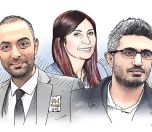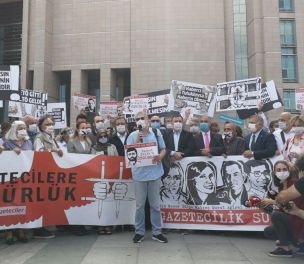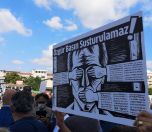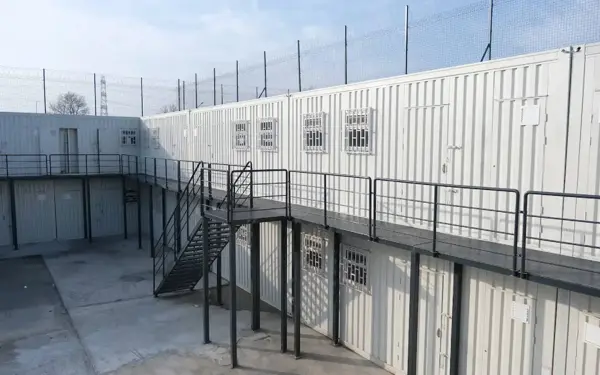Click to read the article in Turkish
It's 10 in the morning. I got off from the metro bus and began to walk towards the C gate of the courthouse. As I got closer, the crowd seen from afar was getting bigger. The scattered crowd suddenly formed an order. Relatives of the arrested journalists, politicians, journalists, civil society people, dozens of people who didn't want arrested journalists be alone...
They turned their back to the Çağlayan Courthouse. In front of them were the "free" —for now— journalists, who came to report on their arrested colleagues.
They had banners that I had seen in many demonstrations before: "Freedom for journalists," "Journalism is not a crime," "Free press is a democratic tradition," "If the journalist is arrested, you don't hear the news..."
A short statement for the press for the arrested journalists by the Have You Heard Initiative: "Journalists, our friends, colleagues are facing baseless accusations that we have seen for years. They have been imprisoned in Silivri for 112 days with a void indictment."
Then speeches by politicians... I set off without listening to all of them. I set off because I'm worried about grabbing a front seat in the courtroom. Because I want to watch my colleagues Barış Terkoğlu, Barış Pehlivan, Ferhat Çelik, Aydın Keser, Hülya Kılınç, Murat Ağırel and Eren Ekinci from the front row.
After my body temperature was measured at the door of the courthouse, I look for the 34th Heavy Penal Court on the signs on the wall. I found it, it's on the 5th floor.
We are in the elevator with two members of parliament who were coming behind me. The elevator, which doesn't stop on the fifth floor, takes us to the sixth floor and from there we go down to the 5th floor by stairs.
I am glad that no one is in the corridor. I approach the security guard:
— Hello, I have come to watch the journalists' trial.
— Wait for a while, we'll let you in after taking the families.
— How many people will you take in? Is the number determined?
— They said six.
— Okay, thank you.
Then I begin to wait in front of the turnstiles for the time I will be taken in. As I'm waiting with the excitement of grabbing the first place, a hum echoes through the corridor. The group that was making a statement for the press is going up upon the end of the demonstration.
Now I'm not alone in front of the turnstile. People who are coming after one another are showing their identity cards to the security guards at the turnstiles and trying to enter the corridor that opens to the courthouse.
— I am an attorney.
— Come in, please.
— I'm an MP.
— Please, Mr. deputy.
— I am an MP's advisor.
— Come in, please.
— I'm a union chair.
— Come in.
— I'm the provincial chair [of a political party].
— Come in, please.
— I'm the district chair.
— I can't take you in right now.
— But the provincial chair is inside.
— Okay, come in.
— When will we go in, man?
— Wait a little longer. We'll take six people.
— I'm Aydın Keser's brother.
— Was your name on the list? We can take only one person among the relatives of the defendants.
— I'm İsmail Saymaz [a renowned journalist].
— Come in, please.
— Sir, you took İsmail Saymaz, we have been waiting for our turn for half an hour.
— I didn't see in the crowd. Wait.
The front of the courtroom is bursting at the seams.
I guess the authorities who limited the number of people to be taken in courtrooms thought the disease was not contagious in corridors and didn't take a step for that.
As the crowd in front of the courtroom grows, journalists who were left outside object to this unfairness. As our voice rises, the number of security guards behind the turnstile increases, and plainclothes police officers are coming.
Zeynep Kuray, İrem Afşin, Eylem Nazlıer, Murat Sabuncu, Meral Danyıldız, Aslıhan Elibol, Çağdaş Ulus and a few more journalists whose names I don't remember now.
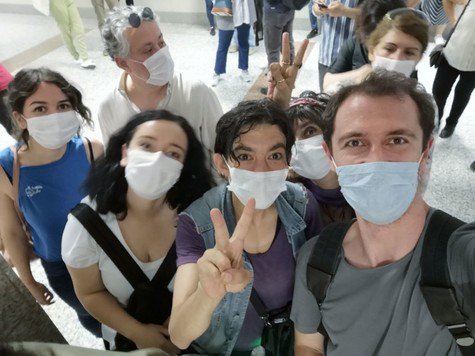
Lawmakers, lawmaker advisors, provincial and district chairs of political parties, and attorneys are inside the courtroom, journalists are in front of turnstiles. Also, relatives of the defendants whose names are not on the list...
As the debate grows up in front of the turnstile, voices start to rise. Former CHP deputy Aylin Nazlıaka speaks with security guards to take journalists inside. But again, the result is negative.
Then comes Tuncay Özkan, another renowned journalist: "Friends, the hearing has not started yet. Everyone will be out soon. Six of the defendants' relatives and six journalists will be taken inside. Do not worry."
It happens as Mr. Özkan said. The hearing, which should have started at 10 a.m., starts at around 11.40 a.m. Everyone in the corridor disperses. But the quota for the number of people to be let in the courtroom is full. "Your friends have gone in, I can't take [you]," says a security guard: "Agree with those who are inside, enter alternately."
Waiting for an hour and a half... The time that passed with arguing... The sadness and nervousness of not being able to publicize the imprisoned journalists' search for justice...
I'm looking at my watch. There is another journalist's trial in Çağlayan: the case of Deniz Yücel, the former Turkey correspondent of Die Welt newspaper who was released after a year of arrest. It's a few minutes before the trial begins.
I am going downstairs from the 34th Heavy Penal Court, where we weren't even allowed to enter the corridor. It's nothing like the crowd upstairs. I approach the security guard again. I tell him that I came to watch Deniz Yücel's trial. He says there is one journalist inside and I might be taken in according to the situation of the courtroom when the hearing begins.
While talking with the security guard, I realize that there is Yasin Kobulan from Press in Arrest. Together with Yasin there are representatives of two international media organizations who are waiting to go in. Just behind them, RSF's Turkey representative Erol Önderoğlu is coming.
When security guards open the turnstile a few minutes later, we think that we are allowed in the courtroom. But when we come to the front of the courtroom, another security guard says, "There is no space inside."
After a little conversation, he allows two people whom we will choose to go in. Thinking about the extent of the case, he tells the international observers, "You come in," we stay outside.
Two cases in one day... The sadness and anger of not being able to follow either case... Courthouse journalism in the days of coronavirus... Incompletely witnessing the search for justice...
The incomplete justice that came at night... The only hope for us, those who are "free for now," is the real justice... (HA/VK)






